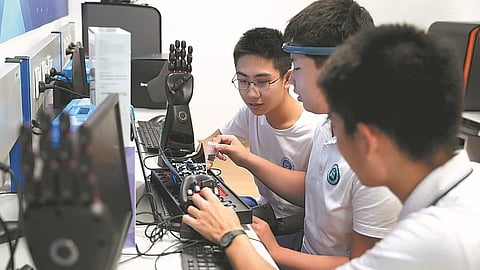

Beijing has become the first provincial-level region in China to introduce compulsory artificial intelligence (AI) education across all primary and secondary schools, marking a major step in integrating high-tech learning into the national education framework.
Starting this semester, more than 1,400 schools in the capital will offer at least eight class hours of AI education across all grade levels, from primary through senior high school.
The initiative follows the release of two official guidelines outlining the framework, curriculum, and teaching methods for AI education in the city.
At Haidian District Experimental Primary School, AI has been incorporated through interactive, project-based lessons for students from Grades 1 to 6.
Younger pupils are introduced to basic AI concepts, while senior students work on developing smart hardware applications.
Two sixth graders, Miao Ruoyi and Fang Xi, both members of the school’s programming club, said they enjoy hands-on projects and coding challenges.
Guangqumen Middle School has established a continuous AI curriculum spanning primary to high school, focusing on preparing students for a future of human-machine collaboration.
At the primary level, AI content is integrated into information technology classes beginning in the third grade.
Middle school students take semester-long courses on AI principles and applications, with older students designing “intelligent study companions” using generative AI tools.
High school students can pursue specialized AI tracks developed in collaboration with the Chinese Academy of Sciences and companies such as Huawei, exploring advanced topics including embodied intelligence, brain-computer interfaces, and autonomous driving.
